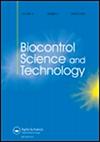在实验室条件下对不同昆虫病原的敏感性研究(鳞翅目:蛾科)
IF 1.2
4区 农林科学
Q4 BIOTECHNOLOGY & APPLIED MICROBIOLOGY
引用次数: 0
摘要
摘要中央杜鹃(Duponchelia fovealis Zeller)是目前被认为是一系列作物中最重要的突发性害虫之一。这种害虫在欧洲很常见,但在美洲,特别是巴西和墨西哥,最近才有报道称它出现在草莓作物上。自从它最近到达墨西哥以来,人们对不同昆虫病原体控制中央凹角虫的潜力的兴趣增加了。在这里我们评估了苏云金芽孢杆菌的商业产品;三种不同的昆虫病原线虫;以及4种昆虫病原真菌的不同分离株。除线虫外,所有病原菌均对3龄幼虫和蛹进行了评价。分析显示,苏云金芽孢杆菌产品之间的毒力存在显著差异,其中毒性最强的产品的毒力是毒性最低产品的9倍。线虫中,嗜菌异habditis bacteriophora毒力最强,幼虫对线虫的敏感性高于蛹;在评估的最高剂量下(200只受感染的幼虫[IJs]),幼虫死亡率在80%至95%之间,而蛹的死亡率在25%至40%之间。昆虫病原真菌引起的幼虫死亡率低于其他昆虫病原;由一株金龟子分枝杆菌引起的最高死亡率为25%,尽管这与其他真菌分离株没有统计学差异。综上所述,以苏云金芽胞杆菌和嗜菌芽胞杆菌为基础的生物防治产品潜力最大;我们认为嗜杆菌杆菌感染幼虫和蛹可能更方便。本文章由计算机程序翻译,如有差异,请以英文原文为准。
Susceptibility of Duponchelia fovealis Zeller (Lepidoptera: Crambidae) to different entomopathogens in laboratory conditions
ABSTRACT Duponchelia fovealis Zeller, is currently considered one of the most important emergent pests of a range of crops. This pest is common in Europe, but its presence in the Americas, particularly Brazil and Mexico, has been only recently reported in strawberry crops. Since its recent arrival in Mexico interest in the potential of different entomopathogens for the control of D. fovealis has increased. Here we evaluated commercial products of the bacterium Bacillus thuringiensis; three different species of entomopathogenic nematodes; and different isolates of four species of entomopathogenic fungi. All pathogens were evaluated against 3rd instar larvae, except nematodes which were evaluated against both larvae and pupae. Analysis revealed significant differences in virulence amongst B. thuringiensis products, where the most virulent was nine times more virulent than the least virulent product. Amongst nematodes, Heterorhabditis bacteriophora was the most virulent and larvae were more susceptible to nematodes than pupae; larval mortalities at the highest dose evaluated (200 infective juveniles [IJs]) were between 80 and 95%, while for pupae they were between 25 and 40%. Mortality of larvae due to entomopathogenic fungi was lower than for the other entomopathogens; the highest mortality observed was 25% caused by an M. anisopliae isolate, although this was not statistically different to other fungal isolates. Overall, our results showed that biological control products based on B. thuringiensis or the nematode H. bacteriophora have the greatest potential; we consider that H. bacteriophora could be more convenient as it infects larvae and pupae.
求助全文
通过发布文献求助,成功后即可免费获取论文全文。
去求助
来源期刊
CiteScore
3.20
自引率
7.10%
发文量
64
审稿时长
4-8 weeks
期刊介绍:
Biocontrol Science and Technology presents original research and reviews in the fields of biological pest, disease and weed control. The journal covers the following areas:
Animal pest control by natural enemies
Biocontrol of plant diseases
Weed biocontrol
''Classical'' biocontrol
Augmentative releases of natural enemies
Quality control of beneficial organisms
Microbial pesticides
Properties of biocontrol agents, modes of actions and methods of application
Physiology and behaviour of biocontrol agents and their interaction with hosts
Pest and natural enemy dynamics, and simulation modelling
Genetic improvement of natural enemies including genetic manipulation
Natural enemy production, formulation, distribution and release methods
Environmental impact studies
Releases of selected and/or genetically manipulated organisms
Safety testing
The role of biocontrol methods in integrated crop protection
Conservation and enhancement of natural enemy populations
Effects of pesticides on biocontrol organisms
Biocontrol legislation and policy, registration and commercialization.

 求助内容:
求助内容: 应助结果提醒方式:
应助结果提醒方式:


